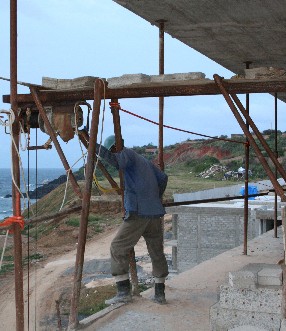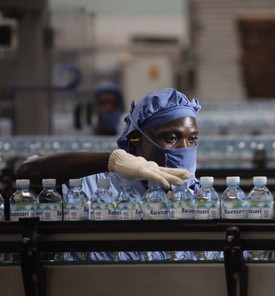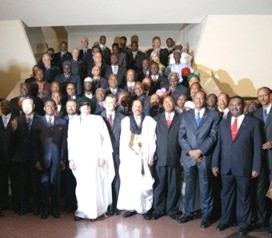|
Africa Economy - Development Ongoing boom makes Africa investors' dream
Many global investors still shy away from Africa, falling victim to the continent's outdated image of war, corruption, political instability, financial chaos and universal poverty and suffering. Investors opening their eyes to the African reality however are making the business of their lives on the continent, real numbers demonstrate.
Indeed, for the first time in history Africa has by now already become an economy of importance. Africa's collective GDP, at US$ 1.6 trillion in 2008, is now roughly equal to Brazil's or Russia's. Even the African consumer market is now of global importance: While Africa still has fewer inhabitants than India, it by now has a higher number of middle class and middle income households than India. African experienced poor growth in the 1980s and 90s, still forming the collective minds of the Western world when viewing Africa. "But sometime in the late 1990s, the continent began to stir," the introduction to the McKinsey report says. "GDP growth picked up and then bounded ahead, rising faster and faster through 2008. Today, while Asia's tiger economies continue to expand rapidly, we foresee the potential rise of economic lions in Africa's future," the McKinsey analysts conclude. Already today, "the rate of return on foreign investment in Africa is higher than in any other developing region," the report says, agreeing with the BCG report. The statistical annex to the McKinsey report provides impressive facts about the emerging rise of Africa, begun in the 2000-08 period. During that time, only five African countries lived up to the cliché of chaos and stagnation, with average GDP growth close to zero or even negative: the Central African Republic, Côte d'Ivoire, Guinea-Bissau, Liberia and Zimbabwe. The remaining 48 African countries showed annual average growth rates between 2 an 21 percent. 38 out of the continent's 53 countries had annual GDP growth rates of 4 percent or more during the entire period, mostly by far exceeding their population growth and as such also rapidly increasing their GDP per capita. A sizable middle class therefore is about to emerge in most of Africa. While some of the highest growth rates during the last decades have been in oil exporting nations - Equatorial Guinea's GDP grew by an annual average of 21 percent, Angola's by 13 percent - in general Africa's sudden and mostly unexpected boom is driven by a diversification of national economies. Strong economic growth is indeed registered in most categories of African nations. Post-war economies - Africa has managed to end many of its worst armed conflicts - are quickly picking up, with average annual growth in Sierra Leone reaching an impressive 11 percent from 2000 to 2008, second only to post-war Angola's oil economy. Post-genocide Rwanda's economy grew by 7 percent each year, Mozambique's and Uganda's even by 8 percent. The McKinsey report notes that even "pre-transition" national economies - countries still largely dependent of agriculture - are growing fast and have started to diversify. Ethiopia's economy grew by an impressive 8 percent each year in the period; Mali's and Burkina Faso's economies by 6 percent. A large number of countries are seen to be "in transition" towards a diversified economy. Most of these nations can show to durable and high growth rates in the 2000-08 period, including Tanzania (7 percent), Ghana (6 percent), Zambia (5 percent), Cameroon, Kenya, Madagascar and Senegal (4 percent). Several African economies are already seen as "diversified", with the GDP share of manufacturing and services exceeding 70 percent. These include Cape Verde, Egypt, Lesotho, Mauritius, Morocco, Namibia, South Africa and Tunisia. All these diversified economies grew by 4-6 percent annually in the period. While the McKinsey report documents the successes already achieved in Africa, it is even more optimistic about the future an
With urbanisation rates similar to China and the world's fastest growing cities, the middle class is steadily growing and Africa's construction sector is living its greatest ever boom, for the first time becoming a major industry on the continent. A growing number of international investors have discovered this boom. Direct foreign investments into Africa only totalled US$ 9 billion in 2000, but increased sevenfold to US$ 62 billion in 2009. And while investors earlier only focused on Africa's natural resources, new investments focus on Africa's booming construction, tourism, banking and telecommunication sectors, the McKinsey analysts found. New industries are in the coming, with African transition economies - such as Ghana, Kenya and Senegal - moving onto exports of manufactured goods including processed fuels, processed food, chemicals, textiles and cosmetics. And this is only the beginning for Africa's expected industrial revolution. Indeed, McKinsey finds that productivity in African transition economies already is as high as in India and China, while labour costs are far lower. Only remaining red tape and poorer infrastructure makes production costs in Africa somewhat higher than in Asia's giant economies. Parallel with a projected industrial revolution in Africa, the continent is set to copy Asia's green revolution. Over 60 percent of the world's unexploited agricultural lands are located in Africa, and with a growing global population and new needs in the production of for example biofuels, these unexploited lands are already becoming the target of massive investments. The McKinsey and BCG reports agree that Africa still has some major challenges to overcome to secure its exit from poverty. This includes the need to remove inter-African trade barriers; invest massively in infrastructure and communication; strongly improving the education sector; and improving public health throughout the continent. All this, however, are major policy concerns of African leaders and analysts, also being the focus of the strengthened regional organisations such as the Africa Union (AU), the Southern African Development Community (SADC) and the new common market now being established, the East African Community (EAC), comprising of Kenya, Tanzania, Uganda, Rwanda and Burundi. Asking whether these high growth rates and booming businesses will continue in the coming decades, both McKinsey and BCG are optimistic. McKinsey has no doubt that Africa's role in the global economy will continue to increase rapidly. "By 2040, Africa will be home to one in five of the planet's young people and will have the world's largest working-age population," surpassing China, the report emphasises. This not only will have to influence Africa's future key place in global production, it will also make Africa a major market of the future. The number of African households with discretionary income is projected to rise by 50 percent over the next 10 years, reaching 128 million. "By 2030, the continents' top 18 cities could have a combined spending power of US$ 1.3 trillion," the McKinsey report projects. "Global executives and investors cannot afford to ignore the continent's immense potential. A strategy for Africa must be part of their long-term planning," McKinsey analysts conclude. And Africa cannot afford to move away from its path of democracy, stability and economic liberalisation to secure that investors remain interested. By staff writers © afrol News - Create an e-mail alert for Africa news - Create an e-mail alert for Economy - Development news
On the Afrol News front page now
|
front page
| news
| countries
| archive
| currencies
| news alerts login
| about afrol News
| contact
| advertise
| español
©
afrol News.
Reproducing or buying afrol News' articles.
You can contact us at mail@afrol.com










